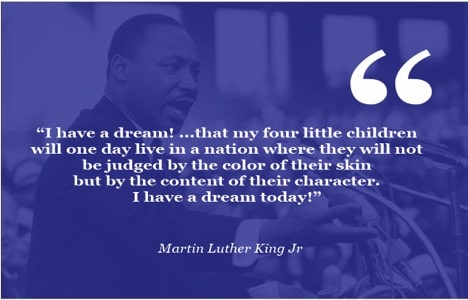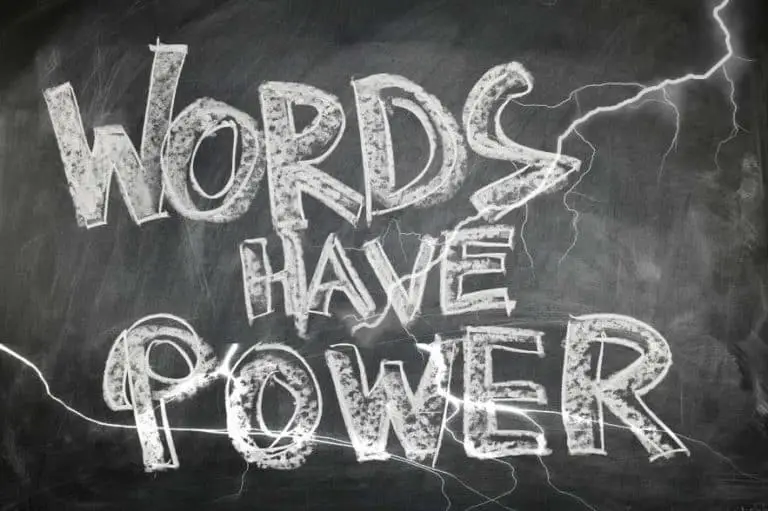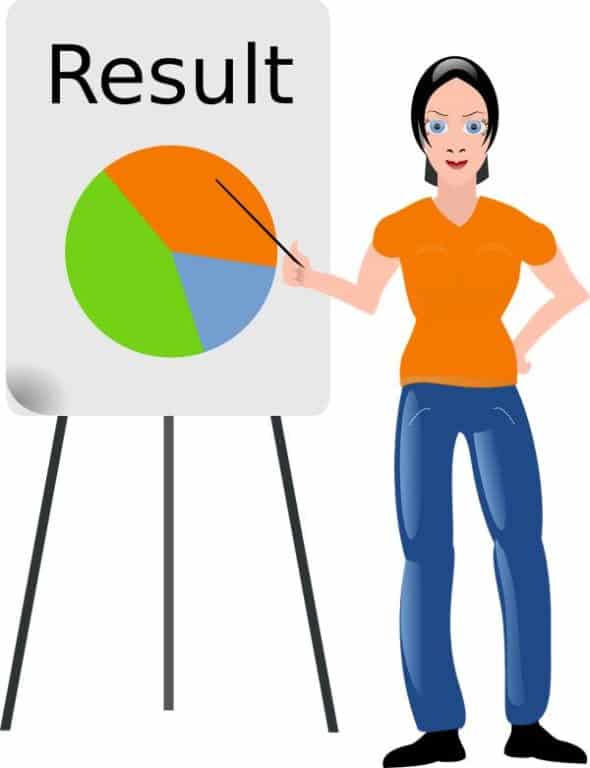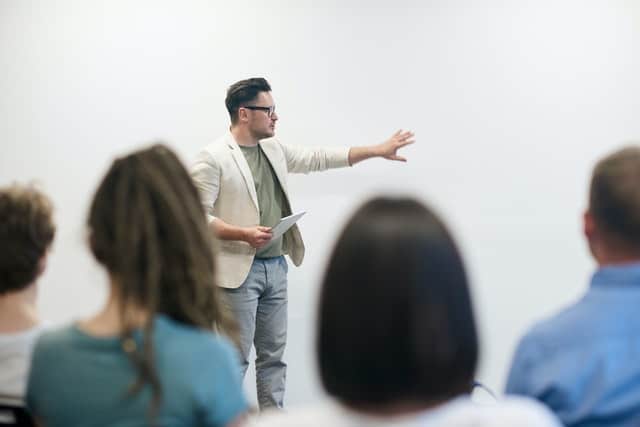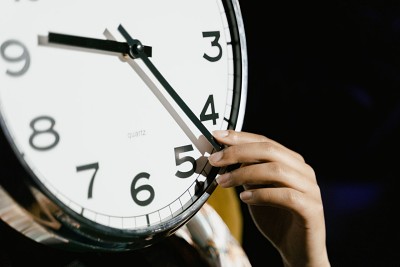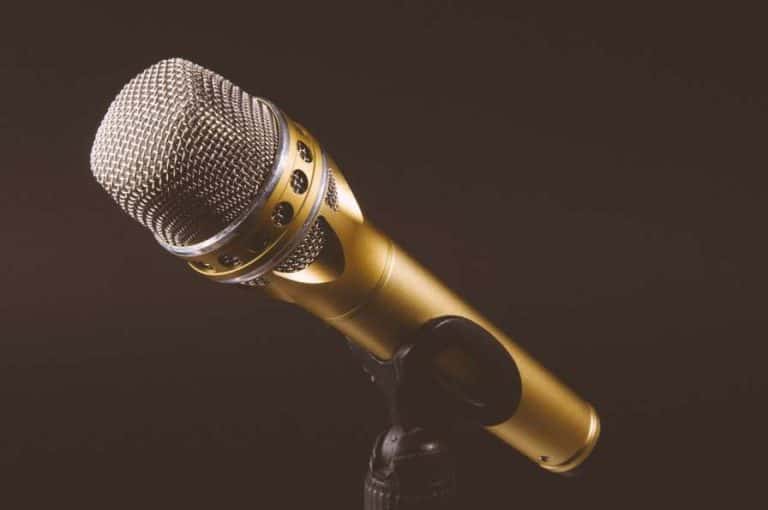The I Have A Dream Speech By Martin Luther King Jr
The “I Have A Dream” speech, which was delivered by Martin Luther King Jr on August 28, 1963, was part of the speeches delivered during the March on Washington to secure the enactment of the Civil Rights Acts in 1964.
The Speech, which was a call for freedom and equality, turned out to become one of the defining moments that characterized the civil rights movement. In fact, The “I Have A Dream” speech by Martin Luther King Jr is regarded as one of the most heroic speeches in the history of America.
The I Have A Dream speech delivered by Rev Dr. Martin Luther King Jr was presented after a long match and series of speeches about unemployment, federal legislation, racial and social justice in front of the Lincoln memorial Mall. And over 250,000 people were in attendance at the National Mall. While giving his Speech, Rev Dr. Martin Luther King Jr began with a subtle approach by talking about what it felt like to be a negro or black in America in 1963.
“But we refuse to believe that the bank of justice is bankrupt. We refuse to believe that there are insufficient funds in the great vaults of opportunity of this nation. And so we’ve come to cash this check, a check that will give us upon demand the riches of freedom and the security of justice.”
-Martin Luther King Jr-
He also added that the race relation between the ‘Whites’ and the ‘Blacks’ in America was a shameful condition even after 100 years the Emancipation Proclamation on September 22, 1862, by Abraham Lincoln. Adding to this, Martin Luther King Jr also noted that African Americans were still held under bound and that they were “crippled by the manacles of segregation and the chains of discrimination.”
During his speech, Dr. King didn’t talk about the marchers’ demands or particular bills after congress like the previous speakers did during the March on Washington. Instead, Martin Luther King Jr talked about the situation of the Civil Rights Movement in a broader landscape in relation to the history of America. By this, Dr. King talked about – the time past, the present as well as the future, all in the timeless vistas of the scripture.
While giving his speech, Martin Luther King Jr was about halfway on his prepared speech, and then suddenly, Mahalia Jackson who had earlier given an inspiring spiritual rendition “I Been Buked and I Been Scorned” – cried out to Dr. King from the speaker’s stand saying “tell them about the dream, Martin, tell them about the Dream!”
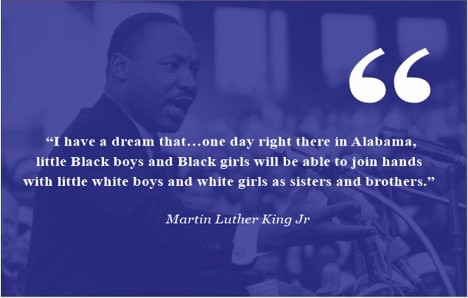
With her call, Mahalia was referring to a speech in which Dr. King had earlier delivered on different occasions, and Dr. Martin Luther King Jr immediately switched from his prepared Speech to begin an extraordinary speech about the dream theme, which has become one of the most outstanding and popular refrains all around the world.
“I say to you today, my friends, so even though we face the difficulties of today and tomorrow, I still have a dream. It is a dream deeply rooted in the American dream.”
-Martin Luther King Jr-
With Dr. King’s improvised riff, he quickly recollected the history of America, sliding from poetry to prose, from the pulpit to the podium. And as he continued, his voice was pitched with an emotional crescendo, especially as he continued his improvised riff with a radiant vision of hope (of what America could become) instead of his initial sobering evaluation of the current social injustice which the blacks were going through.
For more details on the analysis of I have A Dream speech, please check out our other article discussing speech analysis and giving you an easy step by step guide on how to analyze a speech.
Why Is This Speech So Important?
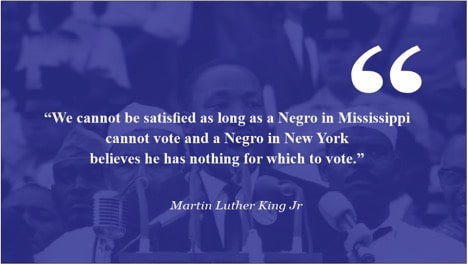
Martin Luther’s speech was not only the foundational and heart of the March on Washington. It was also a demonstration of the transformative powers of a single man through the magical words of his Speech.
Also, many people think that Dr. King’s Speech was also a driving force that led to the enactment of the Civil Rights Acts in 1964.
And according to a 1999 poll of scholarly public address, Dr. King’s Speech was on the top of the list as the best American Speech of the 20th century. On this blog, you can find a list of the top 41 most famous speeches in history, and listed there is The I have A Dream Speech, of course. Check the list out if you’re curious about more inspiring and powerful, history-changing speeches.
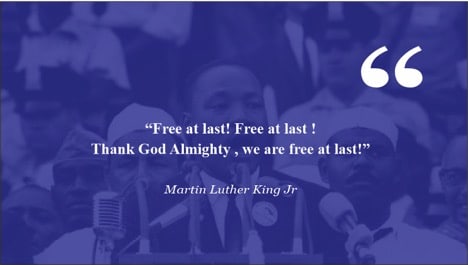
Below is the full script of Martin Luther’s Speech on August 28, 1963.
Martin Luther King – I have A Dream Speech Video
If you are like me, then aside from going through the text and diving into the speech itself, you’d love to hear and see the speech, please watch the video below on the I have a Dream speech.
I have a Dream Audio Clip: You can also enjoy listening to it on the go, just follow the link below.
https://archive.org/details/MLKDream
The I Have a Dream Speech Text
For those who would rather go through the text and really capture how amazing and touching the speech really was, then please take a look at the full text of the I have A Dream Speech below.
Original Text Source: https://kinginstitute.stanford.edu/king-papers/documents/i-have-dream-address-delivered-march-washington-jobs-and-freedom
“I am happy to join with you today in what will go down in history as the greatest demonstration for freedom in the history of our nation.
Five score years ago, a great American, in whose symbolic shadow we stand today, signed the Emancipation Proclamation. This momentous decree came as a great beacon light of hope to millions of Negro slaves who had been seared in the flames of withering injustice. It came as a joyous daybreak to end the long night of their captivity.
But one hundred years later, the Negro still is not free. One hundred years later, the life of the Negro is still sadly crippled by the manacles of segregation and the chains of discrimination. One hundred years later, the Negro lives on a lonely island of poverty in the midst of a vast ocean of material prosperity. One hundred years later, the Negro is still languished in the corners of American society and finds himself an exile in his own land. And so we’ve come here today to dramatize a shameful condition.
In a sense, we’ve come to our nation’s capital to cash a check. When the architects of our republic wrote the magnificent words of the Constitution and the Declaration of Independence, they were signing a promissory note to which every American was to fall heir. This note was a promise that all men, yes, black men as well as white men, would be guaranteed the “unalienable Rights” of “Life, Liberty and the pursuit of Happiness.” It is obvious today that America has defaulted on this promissory note, insofar as her citizens of color are concerned. Instead of honoring this sacred obligation, America has given the Negro people a bad check, a check which has come back marked “insufficient funds.”
But we refuse to believe that the bank of justice is bankrupt. We refuse to believe that there are insufficient funds in the great vaults of opportunity of this nation. And so, we’ve come to cash this check, a check that will give us upon demand the riches of freedom and the security of justice.
We have also come to this hallowed spot to remind America of the fierce urgency of Now. This is no time to engage in the luxury of cooling off or to take the tranquillizing drug of gradualism. Now is the time to make real the promises of democracy. Now is the time to rise from the dark and desolate valley of segregation to the sunlit path of racial justice. Now is the time to lift our nation from the quicksands of racial injustice to the solid rock of brotherhood. Now is the time to make justice a reality for all of God’s children.
It would be fatal for the nation to overlook the urgency of the moment. This sweltering summer of the Negro’s legitimate discontent will not pass until there is an invigorating autumn of freedom and equality. Nineteen sixty-three is not an end, but a beginning. And those who hope that the Negro needed to blow off steam and will now be content will have a rude awakening if the nation returns to business as usual. And there will be neither rest nor tranquillity in America until the Negro is granted his citizenship rights. The whirlwinds of revolt will continue to shake the foundations of our nation until the bright day of justice emerges.
But there is something that I must say to my people, who stand on the warm threshold which leads into the palace of justice: In the process of gaining our rightful place, we must not be guilty of wrongful deeds. Let us not seek to satisfy our thirst for freedom by drinking from the cup of bitterness and hatred. We must forever conduct our struggle on the high plane of dignity and discipline. We must not allow our creative protest to degenerate into physical violence. Again and again, we must rise to the majestic heights of meeting physical force with soul force.
The marvellous new militancy which has engulfed the Negro community must not lead us to a distrust of all white people, for many of our white brothers, as evidenced by their presence here today, have come to realize that their destiny is tied up with our destiny. And they have come to realize that their freedom is inextricably bound to our freedom.
We cannot walk alone.
And as we walk, we must make the pledge that we shall always march ahead.
We cannot turn back.
There are those who are asking the devotees of civil rights, “When will you be satisfied?” We can never be satisfied as long as the Negro is the victim of the unspeakable horrors of police brutality. We can never be satisfied as long as our bodies, heavy with the fatigue of travel, cannot gain lodging in the motels of the highways and the hotels of the cities. We cannot be satisfied as long as the negro’s basic mobility is from a smaller ghetto to a larger one. We can never be satisfied as long as our children are stripped of their self-hood and robbed of their dignity by signs stating: “For Whites Only. “We cannot be satisfied as long as a Negro in Mississippi cannot vote and a Negro in New York believes he has nothing for which to vote. No, no, we are not satisfied, and we will not be satisfied until “justice rolls down like waters, and righteousness like a mighty stream.”
I am not unmindful that some of you have come here out of great trials and tribulations. Some of you have come fresh from narrow jail cells. And some of you have come from areas where your quest — quest for freedom left you battered by the storms of persecution and staggered by the winds of police brutality. You have been the veterans of creative suffering. Continue to work with the faith that unearned suffering is redemptive. Go back to Mississippi, go back to Alabama, go back to South Carolina, go back to Georgia, go back to Louisiana, go back to the slums and ghettos of our northern cities, knowing that somehow this situation can and will be changed.
Let us not wallow in the valley of despair, I say to you today, my friends.
And so even though we face the difficulties of today and tomorrow, I still have a dream. It is a dream deeply rooted in the American dream.
I have a dream that one day this nation will rise up and live out the true meaning of its creed: “We hold these truths to be self-evident, that all men are created equal.”
I have a dream that one day on the red hills of Georgia, the sons of former slaves and the sons of former slave owners will be able to sit down together at the table of brotherhood.
I have a dream that one day even the state of Mississippi, a state sweltering with the heat of injustice, sweltering with the heat of oppression, will be transformed into an oasis of freedom and justice.
I have a dream that my four little children will one day live in a nation where they will not be judged by the color of their skin but by the content of their character.
I have a dream today!
I have a dream that one day, down in Alabama, with its vicious racists, with its governor having his lips dripping with the words of “interposition” and “nullification” — one day right there in Alabama little black boys and black girls will be able to join hands with little white boys and white girls as sisters and brothers.
I have a dream today!
I have a dream that one day every valley shall be exalted, and every hill and mountain shall be made low, the rough places will be made plain, and the crooked places will be made straight; “and the glory of the Lord shall be revealed and all flesh shall see it together.”
This is our hope, and this is the faith that I go back to the South with.
With this faith, we will be able to hew out of the mountain of despair a stone of hope. With this faith, we will be able to transform the jangling discords of our nation into a beautiful symphony of brotherhood. With this faith, we will be able to work together, to pray together, to struggle together, to go to jail together, to stand up for freedom together, knowing that we will be free one day.
And this will be the day — this will be the day when all of God’s children will be able to sing with new meaning:
My country ’tis of thee, sweet land of liberty, of thee I sing. Land where my fathers died, land of the Pilgrim’s pride, From every mountainside, let freedom ring!
And if America is to be a great nation, this must become true.
And so let freedom ring from the prodigious hilltops of New Hampshire.
Let freedom ring from the mighty mountains of New York.
Let freedom ring from the heightening Alleghenies of Pennsylvania.
Let freedom ring from the snow-capped Rockies of Colorado.
Let freedom ring from the curvaceous slopes of California.
But not only that:
Let freedom ring from Stone Mountain of Georgia.
Let freedom ring from Lookout Mountain of Tennessee.
Let freedom ring from every hill and molehill of Mississippi.
From every mountainside, let freedom ring.
And when this happens, and when we allow freedom ring, when we let it ring from every village and every hamlet, from every state and every city, we will be able to speed up that day when all of God’s children, black men and white men, Jews and Gentiles, Protestants and Catholics, will be able to join hands and sing in the words of the old Negro spiritual:
Free at last! Free at last!
Thank God Almighty, we are free at last!”
References
- https://www.americanrhetoric.com/speeches/mlkihaveadream.htm
- https://kinginstitute.stanford.edu/king-papers/documents/i-have-dream-address-delivered-march-washington-jobs-and-freedom (Text)
- https://archive.org/details/MLKDream (Audio)
- https://en.wikipedia.org/wiki/I_Have_a_Dream
- https://thekingcenter.org
- https://news.wisc.edu/i-have-a-dream-leads-top-100-speeches-of-the-century/
- https://www.npr.org/2010/01/18/122701268/i-have-a-dream-speech-in-its-entirety
- https://www.britannica.com/topic/I-Have-A-Dream

